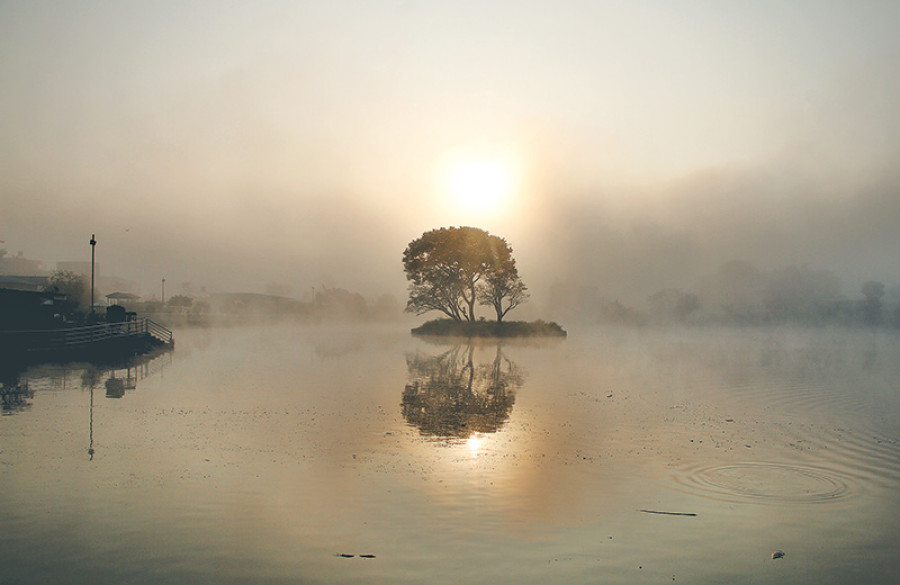Health
With winter here, respiratory infections will surge and so will the virus spread, doctors warn
Cold, dry air, low humidity, indoor stay and poorly ventilated rooms likely to facilitate the transmission of the coronavirus.
Arjun Poudel
Winter is here. And for the virus, it is a godsend.
Doctors say the Covid-19 pandemic could get worse during cold months, as conditions that exacerbate other winter-related respiratory infections also apply to SARS-CoV-2.
“Cold, dry air facilitates the spread of the virus,” said Dr Niraj Bam, an associate professor at the Institute of Medicine, Tribhuvan University. “There certainly are concerns about the rise in Covid-19 infections during the winter.”
According to Bam, with the start of winter, around 150 people are visiting the TU teaching hospital’s out-patient department seeking treatment for respiratory diseases.
“This is a five-fold increase compared to a month ago,” Bam told the Post. “Among them, the number of people infected with Covid-19 is significant.”
Nepal woke up to the pandemic a little later than other countries. Even though the first Covid-19 case was detected in Wuhan of China, Nepal’s northern neighbour, in mid-November last year, Nepal reported its first coronavirus case in the third week of January, a winter month. The next case was only at the end of March.
Doctors say it is yet to be seen how SARS-CoV-2, the virus that causes Covid-19, will respond during this winter. But since Nepal does see a surge in viral infections—seasonal flu, rhinovirus and adenovirus, which infect the lungs and respiratory tracts—during cold conditions, concerns are valid, they say. Winter months mean people are more likely to stay indoors most of the time with closed doors and windows, thereby increasing the chances of virus infections, according to them.
In just about a month, Nepal will mark the first year of its first Covid-19 case.
As of Tuesday, the country’s Covid-19 tally has reached 224,078 with 1,361 deaths.
So far 204,858 people have recovered.
But there is no room for complacency, say experts.
“If the second wave of coronavirus in European countries—the United Kingdom, France, Germany, Spain—and a rapid increase in new cases and death rate in the United States of America are anything to go by, coming days will not be easy for us,” said Dr Ashesh Dhungana, a pulmonologist and critical care physician at Bir Hospital. “Chances of getting seriously ill will be high if patients infected with any other virus conract the coronavirus.”
Studies suggest there are some reasons why the virus spreads faster during winter.
A drop in temperatures means low humidity, which is considered the virus’ best friend. And when the weather gets cold, air gets drier. People staying indoors also tend to use heating systems to keep themselves warm. This makes the air as well as the tissues lining the respiratory tract dry, which may render mucus ineffective to remove foreign invaders like the virus, including SARS-Cov-2.
“Winter is always a tough season, as we see a sudden surge of respiratory illnesses. This winter is likely to be more dangerous as we have Covid-19 this time,” Dr Somnath Arjyal, former chairman of Nepal Medical Council, a regulatory body of medical doctors told the Post. “Risk of the spread of virus and loss of lives depends on how well we implement safety protocols and make our preparations better.”
Social distancing and use of masks have been highly effective in controlling the virus spread worldwide. But cold weather is likely to force people into poorly ventilated rooms without masks and social distancing.
Concerns have also grown over the decision to open schools outside Kathmandu Valley.
“If we start formal classes without ensuring safety protocols, the virus is likely to penetrate each and every household,” Dr Baburam Marasini, former director at the Epidemiology and Disease Control Division, told the Post.
“What happened in Humla recently should be a wake-up call. The authorities must strictly enforce safety protocols and prepare multi-layer monitoring mechanisms before making decisions to resume classes.”
Authorities in Humla shut down schools and colleges and restricted the movement of people from outside into the district after 56 people including 32 students of Mahabaudha Secondary School in Yalbang in Namkha Rural Municipality tested positive for Covid-19 10 days ago.
Doctors are also worried about more people contracting the coronavirus at hospitals during winter. More people frequent hospitals during winter for cold-related respiratory problems.
Dhungana says Covid-19 patients may be deprived of beds as well during cold months due to an increase in the number of patients with respiratory illnesses.
“I am worried about an increase in Covid-19 mortality rate,” said Dhungana.
Doctors say it could be a double whammy, as safety protocols prepared by the Health Ministry before the end of the lockdown on July 21 are also yet to be fully implemented.
Since the lifting of the lockdown, most of the offices have reopened, public vehicles are operating and restaurants are welcoming guests.
“With the opening up of public places, the risk of infection surge has increased,” said Dhungana. “I am personally not against reopening offices and academic institutions, but we should strictly put in place safety protocols, and we have to focus more on this, as the virus spreads faster during winter and in closed places.”




 9.51°C Kathmandu
9.51°C Kathmandu















